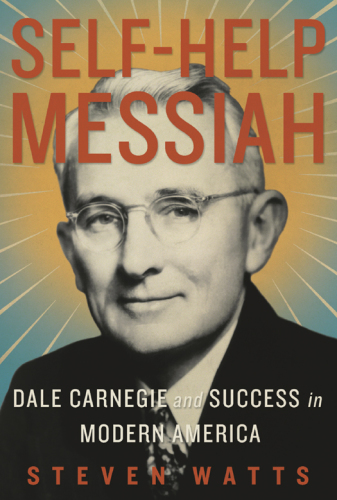
Self-help Messiah
Dale Carnegie and Success in Modern America
کتاب های مرتبط
- اطلاعات
- نقد و بررسی
- دیدگاه کاربران
نقد و بررسی

Starred review from August 19, 2013
The man whose bestselling How to Win Friends and Influence People defined 20th-century American normalcy was a deeply subversive figure, according to this penetrating biography. Historian Watts (The People’s Tycoon: Henry Ford and the American Century) follows Carnegie as he abandons his family’s rural poverty and rock-ribbed Protestantism to become a salesman, actor, theater impresario, Lost Generation novelist, and educator who developed his public-speaking courses into a prescription for psychological renovation and a template for later self-help therapies. Along the way, the author argues, Carnegie embodied and promoted a revolutionary shift from a Victorian code of stern morality, hard work, and self-denial to a modern ethos that locates success in a pleasing personality, a canny stroking of other people’s egos, and the pursuit of self-actualization—with implications both liberating and sinister. (A new biography of mass murderer Charles Manson notes his use of manipulative ploys gleaned from a Dale Carnegie course.) Watts situates Carnegie’s story in a rich account of the dawning age of consumerism, mass entertainment, and a new business culture centered on salesmanship and smoothly meshing corporate bureaucracy, rather than rugged individualism. Watts’s lucid prose and shrewd analysis gives us an absorbing portrait of Carnegie and the America he both reflected and shaped. Photos.

December 15, 2013
Watts (Mr. Playboy: Hugh Hefner and the American Dream, 2008, etc.) recounts the life and times of motivational guru Dale Carnegie (1888-1955). The author goes beyond simple biography to explore the sea-change in American thought heralded by the author of How to Win Friends and Influence People (1936), examining the social, technological and economic upheaval of the early 20th century that shifted emphasis from the idea of "character" to "personality," a more individual-centered focus made possible by unprecedented opportunities for prosperity. Carnegie--born Carnagey--the shrewd author may have sought to align himself in the public mind with successful industrialist Andrew, no relation--grew up in poverty on a farm in Missouri, baffled by the failure of his parents' devotion to Protestant and Victorian ideals of hard work, self-denial and moral rectitude to reap the rewards of material success. Carnegie undertook a number of professions--successfully, in the case of selling meat products, less so in the fields of journalism, acting and fiction writing--before finding great success as a public speaker preaching the gospel of personal reinvention, positive thinking and the importance of cultivating relationship skills. His classic manual on the subject was an instant, massive hit, a revolutionary distillation of Carnegie's principals that continues to sell in significant numbers today and essentially inaugurated the still thriving genre of self-help. Watts portrays Carnegie not as a wildly original thinker or electrifying guru figure but rather as an easygoing, avuncular, self-deprecating (he long maintained a file entitled "Damned Fool Things I Have Done") man, a brilliant synthesizer of ideas from psychology, philosophy, advertising and his own experience. He was an intuitive savant who grasped the nature of his changing times and crafted a message that resonated with a mass culture struggling to adapt. A fascinating portrait of the father of self-help and incisive analysis of the mercurial era that produced him.
COPYRIGHT(2013) Kirkus Reviews, ALL RIGHTS RESERVED.

November 1, 2013
Here Watts (history, Univ. of Missouri; The Magic Kingdom: Walt Disney and the American Way of Life) has written the first full-scale biography of Dale Carnegie (1888-1955), the author of the self-help title How To Win Friends and Influence People, one of the best sellers of the 20th century and the predecessor of such books as Stephen Covey's The 7 Habits of Highly Effective People. Watts draws comparisons among Carnegie's life, his public speaking activities, and his book. He describes his subject's early years in the Midwest growing up in a farming family, his first encounters with public speaking in college, his work as a traveling salesman before moving to New York to begin a full-time career as a public speaker and author, and, finally, the development of his famous book. Watts shows how Carnegie had a mixed impact on American culture; he showed people how better to consider the emotions of others but only for the purpose of improving their own situations. However, his influence can still be felt in 21st-century America through the works of authors such as Oprah Winfrey and Joel Osteen as well as those by researchers who address relationships among people, including Daniel Goleman's Emotional Intelligence. VERDICT This volume will appeal to those who enjoy reading biographies, people who are interested in the history of the self-help movement in America, and students of the cultural history of the United States immediately before and after World War II.--Nathan Rupp, Yale Univ. Medical Lib., New Haven, CT
Copyright 2013 Library Journal, LLC Used with permission.

























دیدگاه کاربران